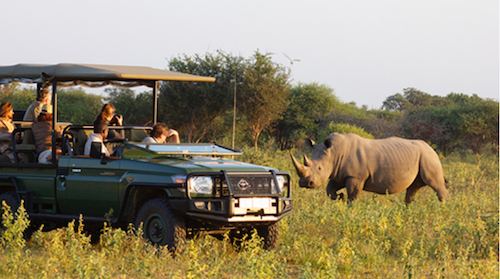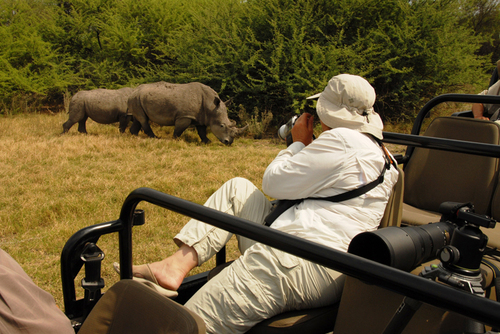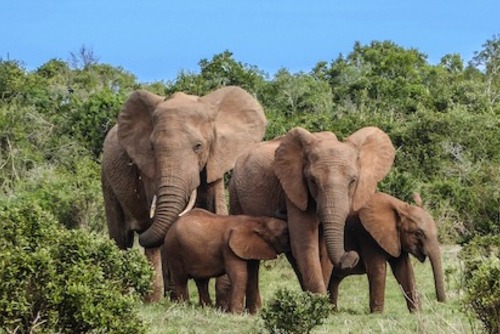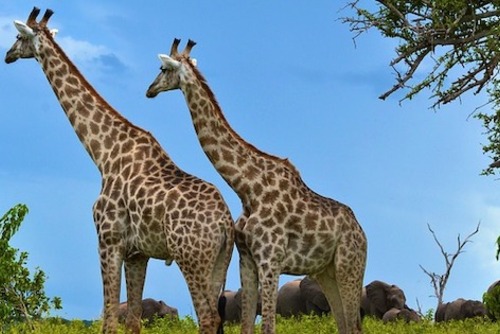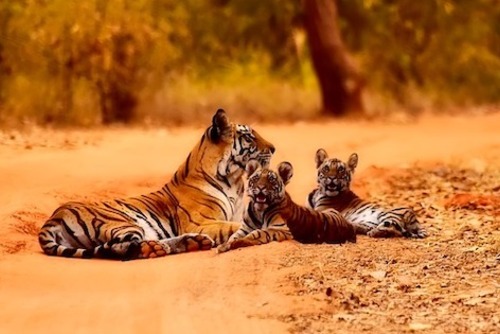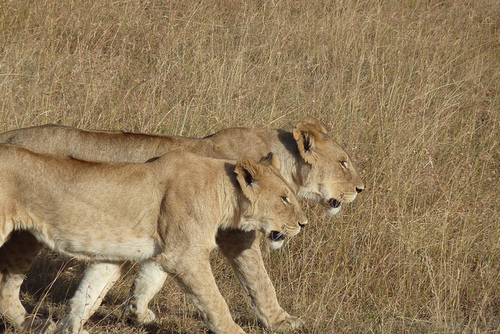How to Become a Safari Guide
Dreaming of a different career? Wondering how to become a safari guide? Book a course through our website which are accredited by F.G.A.S.A. (Field Guides Association of South Africa) and provide a qualification to work as a safari tour guide.
These courses are for people seeking a fresh challenge or career and provide a great chance to live abroad in spectacular settings, you will learn about wildlife / environmental conservation and survival skills, get a greater understanding of the African bush and how to manage game farms. On completion of a course you stand a very good chance of getting employment as a professional field guide.
On our directory you can search and compare the best FGASA qualifications in countries like Botswana and South Africa. There are courses for all levels and abilities where you will train to become a safari field guide and be able to find work afterwards. View more information on our guide below and book a course today.
FGASA Field Guide Courses
The African safari guide training system was developed to teach nature guides working in the industry and taking tourists out in the field to a specific and high standard. A safari guide's job is to interpret the bush/wilderness and its wildlife and ecosystems to the guest and providing the guest(s) with a well-rounded and interesting experience. In addition, it teaches the guide how to be respectful to the ecosystem and its wildlife, and perhaps, most importantly; how to be safe (safety is a big priority in the industry).
Training as a guide basically goes through a number of stages, beginning at the minimum required qualification, level 1. In Africa that is regulated by the Field Guide Association of Southern Africa (FGASA for short) and is known as the FGASA level 1 course. This is the minimum required qualification to work in some capacity in the safari industry; starting as a basic guide in a vehicle. FGASA qualifications go up to level 3 and then also branch out further into specialist fields as guides move up in the industry. The level 1 course is for anyone wishing to go into the industry and is designed to teach people from scratch.
There are lots of level 1 and advanced courses which get students in tune with the bush. The camps are in remote and wild locations with wildlife free to roam as it pleases and learning is done out in the bush via daily bush walks and also game drives that the students themselves have to carry out and learn how to do. It is because of the intimacy students get with the wilderness and those experiences that come with it, that these courses have become very popular as an educational experience and a trip of a lifetime. It beats any safari holiday hands down and nothing will ever come close to it. View our full range of trips on our Africa travel ideas page to get inspired to book a trip.
You can also learn how to become a dangerous game trails guide in South Africa, the focus of the Trails Guide qualification is to develop the required skills in a guide to enable him/her to lead a group of people on foot in a dangerous game area. This includes a good knowledge of navigation using natural phenomena, tracking, situational awareness, rifle handling and animal behavior. An intensive, exciting and adventurous training experience, that also promises to include fantastic encounters with Africa's big game.
In a very similar way, guiding is also carried out in the vast open and very diverse ecosystems of the Australian continent. Guides here do virtually the same job just in a different and in equally stunning wilderness areas. Now Australia is embracing the ethics of guiding and raising their standards too with safari guide courses modeled almost identically on the proven South African system. This will provide guests on safari or outback adventures in Australia with a safer and more informative experience. Kakadu National Park lends itself naturally to being the classroom for this learning.
What Will You Learn
Game ranger training courses are ideal if you are looking for wildlife reserve jobs, or if you just want to improve your personal and professional knowledge of wildlife. On programs you will learn about the following subjects:
-
Field guiding as a profession
- Help creating a guided nature experience
- Geology & Ecology
- Astronomy
- Weather and climate
- Taxonomy
- Biomes
- Botany and grasses
- Arthropods
- Amphibians
- Reptiles
- Fish
- Birds
- Mammals
- Animal behaviour revision
- Conservation management
Participants may also be involved in specific conservation projects such as:
- Telemetry tracking of large predators on the reserve for research purposes
- Community outreach experiences with the local community
- Volunteering with animals
- Anti-poaching patrols
- Monitoring of elephants and rhinos
What to Expect
Over the course duration all participants usually undertake 3 x written tests, 2 x oral presentations and 2 x practical evaluations (walk evaluation and game drive evaluation) to receive a field guide certification from the course provider on completion. For those attendees who wish to pursue Field Guiding as a career, they should also take the officially recognised FGASA certification aspect of the course, for which they will need to become a paid annual member of a Southern African association and register for and complete for FGASA Level 1 exam.
Location of Courses
The safari guide training structure began in Africa and was born from the African Safari industry but some companies now specializes in Safari Ranger Training (Field Guide Training) and wildlife courses and experiences in different countries like Australia. Courses take place in bush camps in South Africa and Botswana that collectively have access to 91,000 hectares of untamed and stunning African bush.
South Africa has wild and diverse fauna and flora that you'll meet face to face as part of this unique opportunity. Camps are designed to allow students to get up close and personal with their environment and are uncluttered, authentic game reserve style, unfenced with occasional nocturnal visitors and the sounds of the bush are literally right outside the accommodation.
A popular course is located in the Shamwari Game reserve in South Africa. This course offers a wonderful, nature based opportunity to learn more about the roles of the Game Rangers and Field Guides from some of the best Ranger/ Field Guide Trainers in the world. This is an incredible opportunity for a real African adventure where you will experience a wonderful opportunity to be part of something amazing and lasting.
The world-renowned Shamwari Game reserve is one of the largest Private Conservation Initiatives in Southern Africa and home to the famous Big 5 and a host of other species. The Shamwari Game Ranger Experience is ideal for anyone who has a passion for the African bush and wishes to all about Africa's wonderful landscape and wildlife and what it is to be a field guide/game ranger. The Shamwari Game Reserve aims to conserve these species and their environment and to establish sustainable solutions to the conflict between the modern world and the natural environment of the region.
This Reserve is your classroom and days will be spent out with the Field Guides and Rangers on game drives, guided walks and sleep-outs, exploring the landscape, gaining first hand exposure of how Game Rangers and Field Guides interface, educate and manage a wildlife resource. Participants will gain a great understanding of African conservation and it wildlife and will leave with experiences and memories that will last a lifetime.
Accommodation
All camps have sleeping arrangements for 2 people sharing (on a single sex basis unless booked as a couple). Kitchens are equipped with gas fridges for storage of all perishable food items. Fresh, drinkable water is available from the taps. A laundry service is provided by camps and three meals a day are included. Below is information on some popular camps where most courses can be joined:
Karongwe Camp: On the banks of the Karongwe River in the 9 000 hectare Karongwe Game Reserve, south-west of the Kruger National Park. The camp consists of 10 walk-in style Meru tents, with twin beds, supplied bedding and mosquito nets. There are shared ablution facilities and a central communal area.
Makuleke Camp: Situated in the Makuleke concession between the Limpopo and Luvuvhu Rivers, Pafuri, Northern Kruger National Park, a true wilderness area, steeped in history and situated in the remotest part of Kruger . Accommodation is in safari style walk-in tents on wooden decks covered with thatch. Each unit has a verandah overlooking the surrounding bush and an en-suite bathroom with a flush toilet, shower and basin. Bedding and mosquito nets are provided.
Selati Camp: Situated on the banks of the Selati River in the Selati Game Reserve to the west of the Kruger National Park. Participants share twin walk in style tents. Students need to bring their own and mosquito nets. There are shared bathroom facilities and a central communal area overlooking the Selati River.
Mashatu Camp: Situated in the Tuli Reserve of Botswana bordering South Africa, an area of outstanding natural beauty. Participants share twin tents. Students need bring to their own bedding and mosquito nets. There are shared bathroom facilities and a central communal area overlooking the dry river bed.
Shamwari: Accommodation is at the student base, located in the outhern part of Shamwari Game Reserve. The facilities include twin en-suite rooms with electricity and hot water and a permanent tented camp facility. There is a plunge pool, entertainment area and outside social areas. Internet access is availability at an additional cost. Three meals a day are provided.
Start Dates
You can join all year round and courses vary in lenght depending on the company you apply with, there are summer spots available but enquire in advance as these courses can fill up quick.
Eligibility
No prior experience is needed to apply for game ranger courses but you should have a passion for wildlife and the environment. An an international drivers license and registration with the FGASA is needed though. You will need an interest in African nature conservation, particularly wetland ecosystems to apply. At the end of a course you will be required to take a practical and theoretical examination and if you pass the exam will be given a certificate and an entry-level qualification in field guiding.
Cost & How to Join
Cost of courses can depend on the company you apply with but generally the price you pay will be around USD$1,000 - $3,000. This will include the game ranger course, accommodation, meals, study materials, training, FGASA / THETA assessment, first aid courses, 4x4 off road driving courses, walks, tea, coffee and cordials, laundry, transfer between the camps and FGASA Annual Subs for the 1st year, registration fees, exam fee and moderation fee. You can book top rated courses through our website today.
Related Pages

